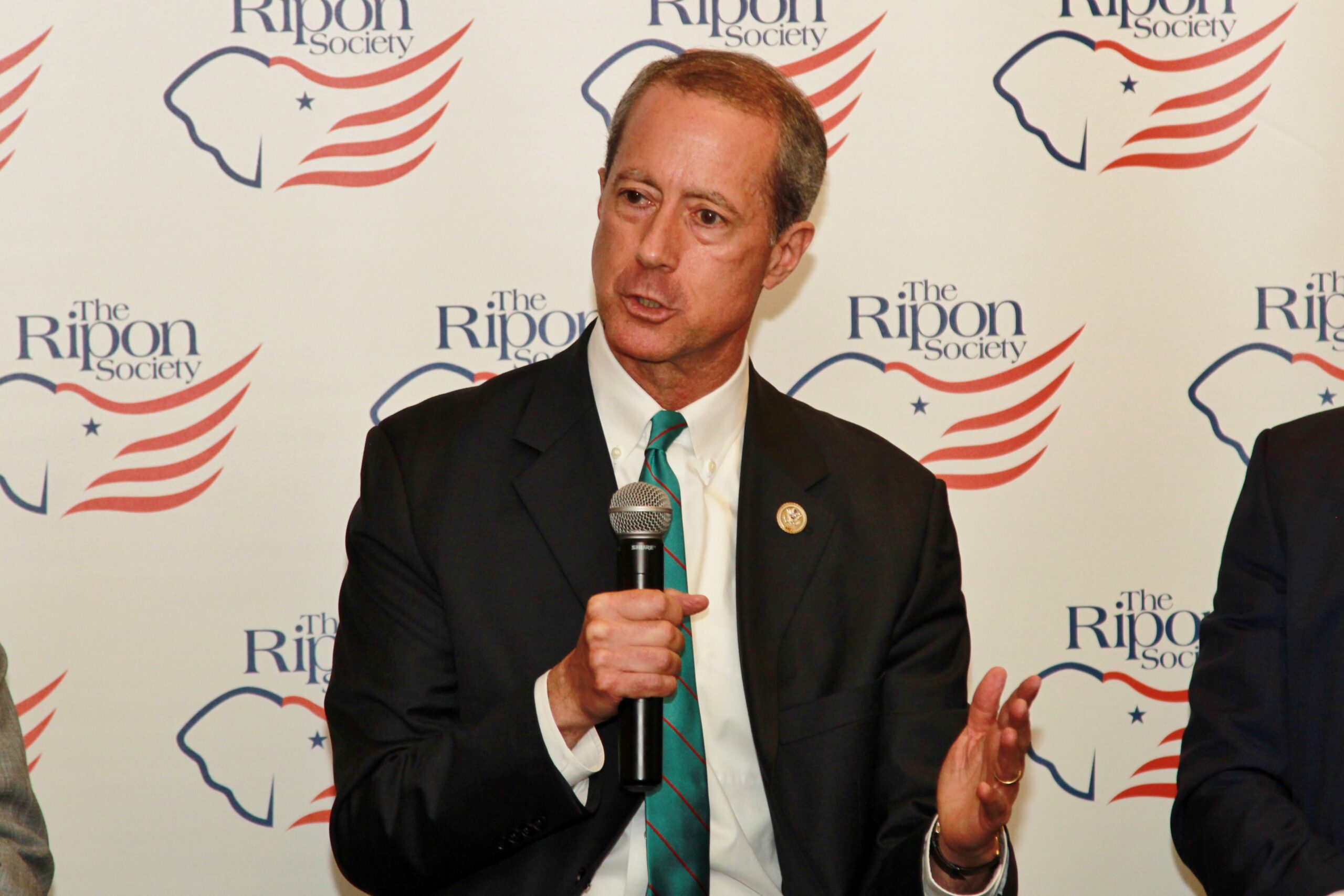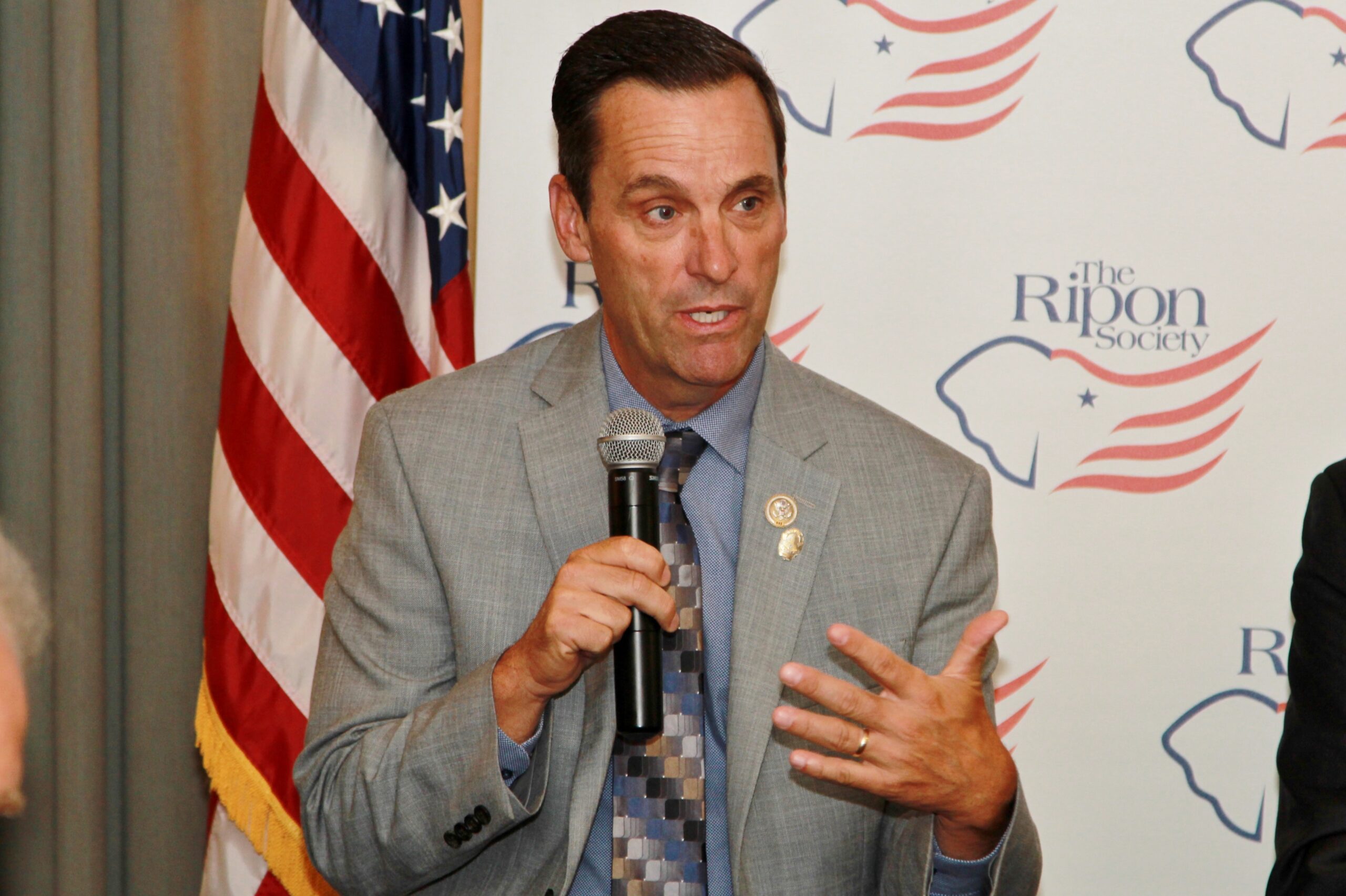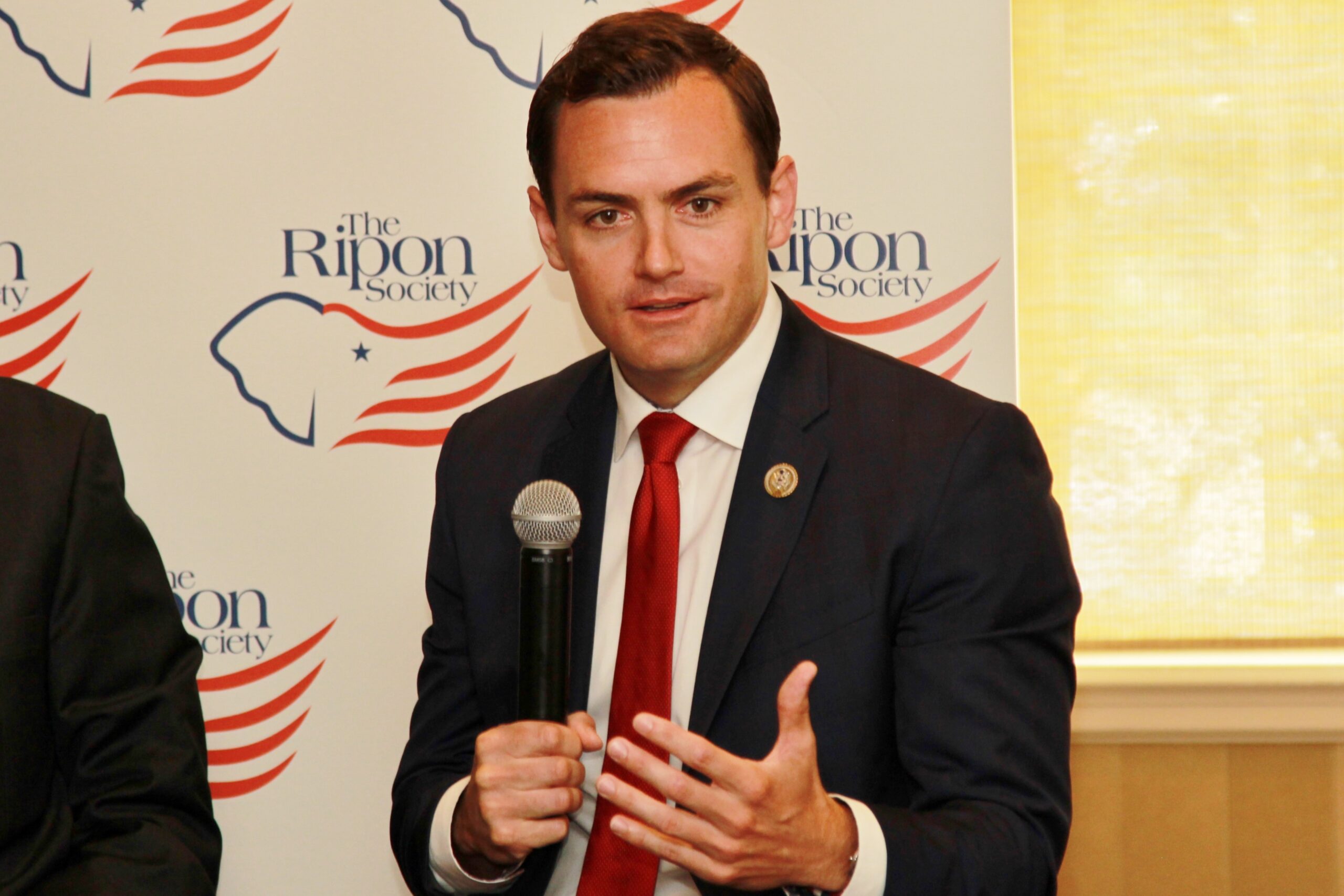 Thornberry, Knight & Gallagher Tout Defense Bill to Rebuild America’s Military
Thornberry, Knight & Gallagher Tout Defense Bill to Rebuild America’s Military
WASHINGTON, DC – With the House of Representatives set to vote on the National Defense Authorization Act of 2019, The Ripon Society held a breakfast discussion yesterday morning with three members of the Armed Services Committee who played a key role in writing the legislation.
The members included: Congressman Steve Knight, who represents the 25th District of California; Congressman Mike Gallagher, who represents the 8th District of Wisconsin; and, Congressman Mac Thornberry, who serves as Chairman of the Armed Services Committee and kicked off the discussion by talking about the bill’s bipartisan support – and bipartisan heritage.
“If passed,” the veteran Texas lawmaker stated, “it will be the 58th consecutive year — under Presidents and Congresses of both parties – that we have signed into law a defense authorization bill. I think it will get a wide, bipartisan vote. Most all of the Democrats have signed the conference report, and it has the support of the key leaders, as well. I think it’s important that we maintain bipartisan support for the men and women who are out there risking their necks for us.”
 Thornberry was first elected as part of the Republican Revolution of 1994, and has chaired the Armed Services panel since 2015. During his tenure as Chairman and over the course of his career, he has earned a reputation not only as a smart hawk who knows more about national security policy than just about anyone in Washington, but as a staunch conservative who believes in taking an even-handed approach.
Thornberry was first elected as part of the Republican Revolution of 1994, and has chaired the Armed Services panel since 2015. During his tenure as Chairman and over the course of his career, he has earned a reputation not only as a smart hawk who knows more about national security policy than just about anyone in Washington, but as a staunch conservative who believes in taking an even-handed approach.
Thornberry talked about this approach in his remarks, and why it is so important in national security policymaking and this year’s Defense Authorization bill.
“There have been over 1,005 amendments that have been proposed either at the subcommittee, full committee, or floor level,” he said of the NDAA. “About half of them have been adopted in some form or another. So this is also one of the last vestiges where all sorts of members can make a contribution to the process.”
“Last point on process — if it’s passed and signed into law, this would be the first time since 1996 that we’ve had a Defense Authorization bill signed into law before the end of the fiscal year. It would also be the earliest it’s been done since 1977 — in other words, 41 years.”
According to the Texas Republican, this year’s NDAA focused on two main areas – rebuilding the military, and reforming the Pentagon.
“The Military Times did a study and found a 40% increase in aircraft accidents since 2011,” he noted. “Because the Department of Defense budget was cut by more than 20% and the world did not get 20% safer, we still had these high demands. You’ve still got to be off the coast of North Korea. We don’t have time to get training, so you have destroyers running into things. You’ve still got to fly those missions over Iraq and Syria, so we’ll have to cannibalize some units in order to keep those flying. That’s the sort of thing that’s happened. Take people out of Army units so you can make other Army units whole. That’s what we’ve been doing and that’s why we’re rebuilding the military.”
“We’re also trying to reform the Pentagon – to provide more value for taxpayers with regard to what we buy, but also make decisions faster. It used to be that government labs could invent a bunch of stuff. Now, much of the innovation occurs in the private sector. The 1950s bureaucracy cannot keep up with the way the high tech community is innovating. So the DoD has to make decisions faster.”
Knight agreed, and opened his remarks by talking about the need to make sure our troops receive not only the resources they need, but the training, as well.
“Look,” he stated bluntly, “if a pilot’s not in the cockpit, if a sailor’s not sailing, and if our ground-pounders aren’t pounding the ground, they’re not learning and they’re not keeping up those perishable skills that they need if we ever have to send them into battle. And the fact of the matter is if our pilots are flying 15 hours a month and the Russian pilots are flying 30 hours a month — I know a lot of people don’t like to hear this — but they’ll probably be better.
“You need to be in the cockpit. That’s the way it is. It’s a perishable skill. Everything that you do in the military is. That’s why when you go into the Army or the Marines and you have that first impression of how they’re teaching you, it’s because they want you to learn and they want it to be imprinted in your brain so every time you do it, you do it the exact same way.”
 Knight was elected to the House in 2014 after spending nearly a decade in state and local office. A veteran of the U.S. Army, he also spent 18 years as an officer with the Los Angeles Police Department. As a member of the Armed Services Committee, he has played a leading role in the development of new technologies such as hypersonic weapons, which he touched on in his remarks.
Knight was elected to the House in 2014 after spending nearly a decade in state and local office. A veteran of the U.S. Army, he also spent 18 years as an officer with the Los Angeles Police Department. As a member of the Armed Services Committee, he has played a leading role in the development of new technologies such as hypersonic weapons, which he touched on in his remarks.
“If you can fire a bowling ball at 3,800 miles an hour,” Knight observed about this new technology, “it has enough kinetic energy to do just about whatever you want it to do without exploding. That is a game changing event. It would be a game changing event for our naval operations in the South China Sea. It would also be a game changing event if a rogue state was able to acquire something like that. So we have to be at the forefront of that.”
Knight has also taken an interest in the development of intelligence, surveillance, and reconnaissance capabilities — something he talked about as well, and something, he said, that is included in this year’s Defense Authorization bill.
“To me, one of the biggest issues for a combatant commander is ISR,” he stated. “If you can’t see what the enemy is doing, if you can’t see the changes from day-to-day, then you are in essence flying blind or you are moving your military a little cockeyed. So ISR is so important to us. That means our U-2s have to be flying. That means that our Global Hawks have to be in the air. That means those types of assets have to be ready and available for our commanders. And this NDAA takes care of an awful lot of that and it moves us in a very positive direction where we haven’t maybe been going that positively over the last 15 years.”
Gallagher also praised this year’s legislation, not just for its programmatic content, but for its strategic direction.
“I think what we’re about to do this week is a remarkable achievement,” he said. “You don’t see that in Congress enough. And I was proud to play a small role in it. I actually think what’s most interesting about the NDAA this year is that it nests quite well within the national security strategy and the national defense strategy – a big conceptual movement, which is to posit that the great power competition with China and Russia is our foremost challenge going forward. And that’s actually a pretty big change.”
“I actually think in some ways, the non-military and non-sort of guns and bombs aspects of the NDAA may prove most important over the long term. Things like, for example, taking a harder look at what the Chinese are doing with their Belt and Road initiative; taking a look at comprehensively reforming the Committee on Foreign Investment in the United States and our processes for reviewing how the Chinese and other countries are investing here in our own national security innovation base; taking a look at foreign talent recruitment programs that have a bizarre and perhaps threatening relationship with some of our universities here, and making sure that we are not opening ourselves up to being spied on by the Chinese.”
 Gallagher was elected to the House in 2016 after spending seven years as a Counterintelligence/Human Intelligence officer in the United States Marines Corps. He deployed twice to Al Anbar Province, Iraq, as a commander of intelligence teams, and also worked for three years in the intelligence community.
Gallagher was elected to the House in 2016 after spending seven years as a Counterintelligence/Human Intelligence officer in the United States Marines Corps. He deployed twice to Al Anbar Province, Iraq, as a commander of intelligence teams, and also worked for three years in the intelligence community.
In addition to praising the NDAA and the work of his colleagues in his remarks, he also offered a note of caution about the approach Congress should take in the months and years ahead.
“I think the Chairman and members on both the left and the right have produced a very comprehensive document that I think will stand the test of time,” the Wisconsin Representative stated. “That being said, I also think we’re at risk of one thing — which is to declare mission accomplished. I mean, $770 billion is a lot of money. It would be easy just to say, ‘We did it — mission accomplished. We did the military rebuild.’ But as everyone knows, it took a while to get into this hole, and it’s going to take us as long if not longer to get out of it. We’re going to have to keep making the case for that.”
Thornberry agreed, and concluded by commending Knight and Gallagher for their work on the NDAA, and the approach that they and other Committee members have taken with regard to keeping America secure.
“One of the things that I appreciate most about our new members is that they are really focused on what’s good for the country,” the Chairman declared. “A somewhat unfair rap on the Armed Services Committee in the past has been, ‘Oh, they’re just looking to protect their district, their base, their jobs — that’s all they care about.’ And that is not so.
“One of the questions I ask somebody who wants to come on the Committee is, ‘Do you care about something more than just your backyard? Are you looking at the bigger picture for country?’ These guys are. And I really think that has been a key asset for us as we talk about these issues — that it’s clear this is not just about jobs and bases, although we all have to represent our districts. This is about how do we protect our freedoms and our people in the light of an unprecedented number of threats, especially going forward.”
To view the remarks of Thornberry, Knight and Gallagher before The Ripon Society breakfast discussion yesterday morning, please click on the link below:
The Ripon Society is a public policy organization that was founded in 1962 and takes its name from the town where the Republican Party was born in 1854 – Ripon, Wisconsin. One of the main goals of The Ripon Society is to promote the ideas and principles that have made America great and contributed to the GOP’s success. These ideas include keeping our nation secure, keeping taxes low and having a federal government that is smaller, smarter and more accountable to the people.



